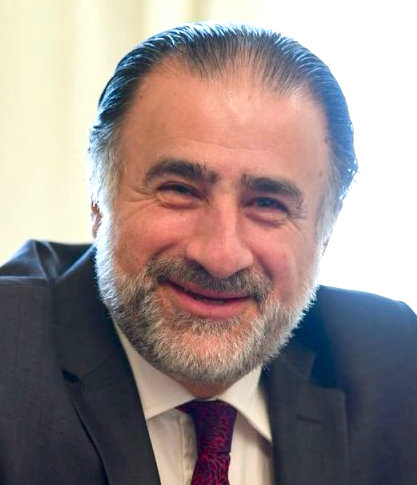
When I sat down to speak with Iraqi Prime Minister Mustafa al-Kadhimi on January 27, he explained his approach to dealing with the many armed, non-state actors in his country.
"There are three ways to tackle the issue,” he told me. “The first is to give in to armed non-state actors and lose everything to chaos. The second is to confront them and start a civil war. And the third is to use containment and diplomacy. I practice the third”. In keeping with this approach, Kadhimi has consistently balanced hard and soft power, using force and negotiation when necessary.
Kadhimi’s domestic balancing act sounds a little like the way his new American counterpart plans to deal with many armed state actors in the world today. Speaking at the US State Department on February 4, President Joe Biden said “America is back. Diplomacy is back at the center of our foreign policy… American leadership must meet this new moment of advancing authoritarianism, including the growing ambitions of China to rival the United States.”
These statements suggest that diplomacy will be central to Biden’s foreign policy, but also that he appreciates the need for more forceful containment, as demonstrated when he sent the destroyer USS John McCain to pass through the Taiwan Strait on February 4.
Kadhimi used a similar approach to confront a strong paramilitary group, Asaib Ahl al-Haq (AAH) on the streets of Baghdad.
"If they threaten us, we will show them our strength," the prime minister said on December 26, referring to a stand-off between government security forces and AAH. This followed the arrest of one of AAH’s military operatives, accused of carrying a rocket attack on the US Embassy. "We put nearly 10,000 troops on the streets…to show the Iraqi people that the government will not tolerate such moves,” Kadhimi said. The next day, the PM despatched an envoy to Tehran to meet with the AAH leader Qais al-Khazali, as well as the Iranians.
This synergy between the leaders of America and Iraq creates a unique opportunity for Baghdad to cooperate with Washington in playing a more prominent and constructive role in the region. With the right foreign and domestic policies, Iraq can become a strategic partner for both Iran and the US, and play a mediatory role between them.
Baghdad is well suited for this role. Iraq is becoming a critical lifeline for Iran in the face of US sanctions, while simultaneously hosting a strategically placed US military base. Geographically, Iraq is an ideal place for Iranian and US officials to visit. Iraq is led by seasoned politicians who can play a significant diplomatic role, including the experienced Minister of Foreign Affairs Fuad Hussein and President Barham Salih, who enjoys a wide range of relations with the regional and international leaders.
In addition, the PM himself has dealt with regional issues in the past as head of Iraq’s National Intelligence Service. "The Prime Minister plays an active and essential role behind the scenes, putting out fires in the region, mediating between various states, and placing Baghdad at the center of any future efforts to solve major conflicts, such between Iran and the US," said a close aide to Kadhimi who wished to remain anonymous.
The Prime Minister is clearly encouraged by "signs and signals" he has received from the new US administration, according to the aide. During the run-up to the first anniversary of the assassination of Iranian military commander Qasem Soleimani, many expected an Iranian-backed military attack on US interests in the region.
A senior Shiite politician close to the Prime Minister revealed that the then-Secretary of State Nominee Antony Blinken asked Kadhimi to “tell the Iranians not to engage in any military action while President Trump is in office… such action would have consequences and complicate any future efforts by the new administration to re-engage the Iranians”. Kadhimi called the Iraqi Shiite politician, who happened to be in Tehran, and asked him to deliver the message to the Iranian officials, and the message was delivered to General Ali Shamkhani and Iranian Foreign Minister Javad Zarif ." Apparently, Zarif was surprised, but welcomed the message – said to be the first received from Biden’s team. Kadhimi’s efforts seems to have paid off. The Iranians never took military action despite public threats and promises of vengeance.
New global and regional dynamics are finally allowing Iraq to play a significant role in shaping the Middle East’s future. This can be an opportunity for Iraq to improve its fortune, but its leadership must think long and hard about where they want to take the country, and implement domestic policies that will help them get there. They need to address the country’s chronic economic crises, systematic corruption, and political instability, as well as the proliferation of arms in the hands of non-state actors.
Both Washington and Tehran have good reason to support Iraq in its efforts to play a more prominent regional role. Iran is uniquely positioned to help curb the armed groups that have undermined the country’s security by firing rockets at the US embassy, attacking international coalition logistical convoys, or burning the offices of media channels that oppose their views. As Iraq’s second-largest trading partner, Iran also stands to gain the most economically from the resulting improvement in stability. The two countries currently conduct $12 billion in trade, spanning construction, food, health, and religious tourism, but in better conditions this could go to $20 billion.
The US should also continue its economic and political support to help Iraq regain its status as a sovereign state. Building on the framework for support and strategic dialogue that is already in place, Washington can help give Baghdad a stronger hand in its regional relations. A stronger Iraq will be a more reliable US partner in stabilizing the Middle East.